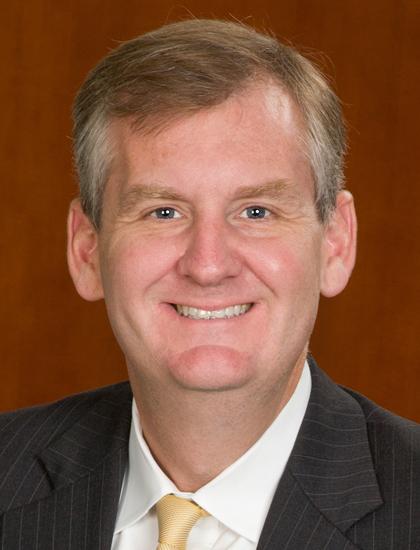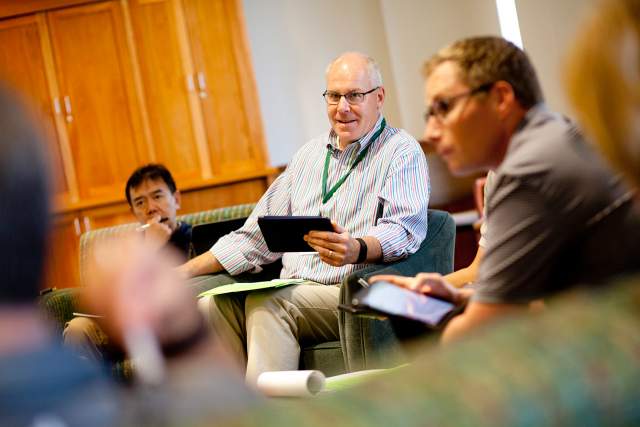As CEO of Calpine, the country’s largest producer of electricity derived from natural gas and geothermal sources, Thad Hill T’95 has plenty on his plate—from complex regulations and fluctuating energy prices to environmental stewardship. Even so, his vision for the company’s culture and evolution remains front and center.
Over the last few years, Hill has sent a number of rising Calpine executives through Tuck’s Leadership and Strategic Impact Program (LSI) and Advanced Management Program (AMP). The result? A Calpine culture that looks quite a bit like Tuck’s.
A Natural Culture Fit
Calpine, which operates 76 power plants in 21 states plus Canada and Mexico, is known for its focus on flexibility and sustainability as well as its data-driven approach to helping customers reduce their emissions footprints.

“At Calpine, collaborative culture and analytical rigor is a part of our DNA. We also want people who aren’t afraid to mix it up with debate and let the best idea win," says Thad Hill T'95, CEO of Calpine. "That’s the type of folks I like to surround myself with, and that’s what Tuck provides.”
But seamless operations aren’t enough to remain competitive in this constantly shifting industry. Companies like Calpine need to adapt quickly and remain one step ahead, a challenge that makes staff who can see the big picture essential. It’s no surprise, then, that Hill’s vision for the company’s culture and evolution remains front and center—or that he turned to Tuck to help bring that vision to life.
For Hill, partnering with Tuck Executive Education to help build a culture of innovation was an easy decision in part because of his personal experience as an MBA student.
“Tuck was a fantastic academic experience in a really great setting, with a unique cultural overlay,” noted Hill, who was named an Edward Tuck Scholar in recognition of academic excellence while in Hanover. “I like to think that at Calpine, we have a collaborative culture and analytical rigor is a part of our DNA. We also want people who aren’t afraid to mix it up with debate and let the best idea win. That’s the type of folks I like to surround myself with, and that’s what Tuck provides.”
Building Diverse Perspectives
Tuck’s executive education programs have proven a valuable launchpad for Calpine’s high performers. As Calpine’s chief administrative officer, Hether Benjamin Brown, explained, “We’ve used this the most for people who do an extremely good job but who have had less breadth of experience in business outside of their primary domain. For example, one may work in treasury and never have any interaction with customer marketing, or in commodities without touching finance. A huge benefit that the Tuck program offers is exposure to diverse and real-world business perspectives in a more comprehensive manner.”
Elynor Reyes, vice president of commercial real-time operations at Calpine, shares that sentiment. Though Reyes initially wondered whether LSI participants from different industries would relate to the highly specific challenges of working in the energy sector, after attending the program in 2020 she found that the range of backgrounds represented was key to its value. “You get to have a different perspective and see how other participants’ experiences can apply to you, and maybe your experiences can apply to them,” Reyes said. “It is helpful, just like diversity is helpful anywhere.”
James Henahan, Calpine’s vice president of commercial analytics, agreed. “The key difference with Tuck was the immersive experience and opportunity to learn from others with very different backgrounds. I appreciated learning from my colleagues in different industries and even countries and getting the chance to really know them.”
That opportunity, Benjamin-Brown noted, is especially important for employees whose experience is not only domain-specific but also focused on a single industry. “I think it’s very important that a company with long-tenured employees gets them exposure to other business issues and other industries, which you can’t get from the energy industry symposiums most people go to,” she explained. “We take a holistic approach to each individual’s development plan.”
Building Strategic and Tactical Skills
That holistic approach means that Calpine carefully matches employees with the Tuck programs right for them. For Henahan, the Tuck Advanced Management Program offered an opportunity to dig into the tactical decisions that senior executives face every day, like the universal challenge of balancing projects and priorities.
“The biggest takeaway for me was how important it is to set aside time each day to plan and reflect,” he noted. “We get so busy with the daily grind that it is very difficult to carve out time for reflection. However, that reflection time is key for setting priorities and making sure that we are working on the most important initiatives.”
One of the keys to identifying which of those initiatives merit the most attention? Understanding the difference between the urgent, day-to-day problems that eat up team bandwidth and the projects that will have a lasting impact on the company’s bottom line.
“It is so critical to separate operational teams and efforts from new development efforts,” Henahan explained. “When urgent items compete with important (but long-term) strategic objectives, the urgent tends to win. When repeated, this can lead to a reduced focus on strategic objectives and suboptimal outcomes long term.”
With those priorities identified, leaders like Henahan are freed up to focus on maximizing team performance.
For Reyes, the Leadership and Strategic Impact Program was a well-timed opportunity to focus on leadership strategies. Promoted into her role immediately before the start of the pandemic, Reyes faced the dual challenges of taking on oversight of a major Calpine function and steering her reports through turmoil. LSI, she noted, gave her valuable perspective on how her staff’s stress could be manifesting at work and tools to lead through a crisis.
Some corporate settings expect you to be a robot, but Calpine takes pride in the fact that we know employees are human beings. ... In the same vein, the professors at LSI showed me that it’s okay to be vulnerable in the corporate world.
—Elynor Reyes, Calpine
“I’ve always been self-aware,” Reyes said, “But now I’m constantly thinking about what I am doing and what I am sharing with people I work with, people who rely on me, and people I may influence. Setting the right tone at the top really helps. The LSI program emphasized that through and through, especially the importance of taking a service leadership approach rather than giving orders. It’s about asking what you can do to help work towards the goal.”
As a new vice president, Reyes found the program’s emphasis on leading with humanity especially impactful. “Some corporate settings expect you to be a robot, but Calpine takes pride in the fact that we know employees are human beings. Calpine knows that there are certain things that trigger emotion or inspire people to work hard. In the same vein, the professors at LSI showed me that it’s okay to be vulnerable in the corporate world.”
Reyes added that LSI professors urged participants to demonstrate authenticity and live out their personal values as leaders. “My people know that I’m not perfect and that I don’t expect perfection from them. Instead, I expect each of us to show up and do our very best for each other and for Calpine.”
Building on Success
For Reyes and Henahan, life after Tuck has meant not only applying their learnings but also maintaining some key habits.
“The most significant change to how I work has been to set aside 30 minutes each day to reflect on strategic priorities and plan for the day or week ahead,” said Henahan. “I’ll admit that I sometimes need to skip this ‘reflection time,’ but I’ve been successful probably 80 percent of the time and have found it to be very important to help me prioritize.”
And for Reyes, connections made through Tuck have provided ongoing access to outside perspectives. “I’m still speaking to at least three other people from LSI,” she explained. “They’re in completely different sectors, but we all have the same challenges because as you move up it’s all about managing processes and managing people. The specifics may not be the same, but it’s similar in that you’re dealing with people who have emotions, needs, and expectations.”
The results of LSI and AMP have been clear to Benjamin-Brown. “I think the Tuck programs are a nice complement and can be a key part of someone’s career evolution,” she said. “It’s another steppingstone in one’s development in our organization and allows them to be more contributory in our strategic discussions. On a personal level, there’s a real appreciation for the investment that Calpine’s making in their development. I have seen those individuals come back energized and make an even more concerted effort to contribute.”
As Calpine continues to evolve, its leaders hope to send additional high-performing staff through Tuck’s programs. For Hill, the partnership is a win for both Calpine and for program participants. “The folks we have sent so far are people I work with and think a lot of. I want to develop them and I also want them to have fun.”

